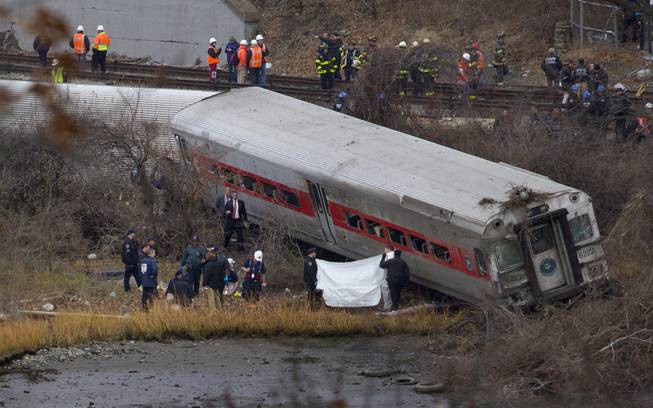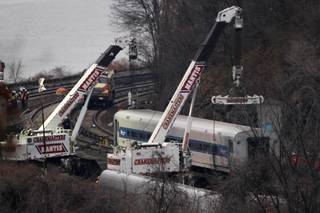
Craig Ruttle / AP
Viewed from Manhattan, first responders and others work at the scene of a derailed Metro North passenger train in the Bronx borough of New York Dec. 1, 2013. The train derailed on a curved section of track in the Bronx early Sunday, coming to rest just inches from the water, killing at least four people and injuring more than 60, authorities said. Police divers searched the waters to make sure no passenger had been thrown in, as other emergency crews scoured the surrounding woods.
Thursday, Dec. 5, 2013 | 8:36 p.m.
NEW YORK — While the Metro-North Railroad is already getting hit with multimillion-dollar civil claims over a deadly commuter train derailment, prosecutors will face tough choices when deciding whether to bring criminal charges against the train's engineer, who told investigators he nodded or fell into a daze at the controls.
Legal experts say drowsy driving isn't necessarily a crime, and it can be tough to prosecute drivers who nod off unless there are extra factors at play, such as drug use or brazen disregard for passenger safety. The prosecutor's office investigating the engineer recently failed to convict a bus driver of manslaughter in a 2011 crash that killed more than a dozen passengers, in part because his drowsiness wasn't accompanied by any such factors.
"There's a sentiment that when something terrible happens, you have to hold someone accountable criminally — that's not always the case," said attorney Andrew Abramson, who represented a Staten Island Ferry pilot sentenced to 18 months in prison following a deadly wreck in 2003. "Sometimes there is a tragedy, and it's really a matter for the civil courts."
Federal and city investigators are gathering information about Sunday's train accident, which killed four people and injured more than 60, and likely will spend months analyzing the conduct of engineer William Rockefeller.
National Transportation Safety Board officials have said the train derailed in the Bronx after hitting a curve at 82 mph — far faster than the 30 mph speed limit.
The accident happened at 7:20 a.m. Rockefeller's lawyer said the engineer had gotten up at 3:30 a.m. for his 5 a.m. shift after going to bed at 8:30 the previous night.
Rockefeller passed a blood-alcohol level breath test, officials said. His lawyer and union chief said he hadn't been using drugs or doing anything else reckless, such as using a phone while at the controls.
The NTSB is trying to build a timeline of what Rockefeller was doing in the 72 hours leading up to the accident, in part to determine whether he might have been sleep-deprived or suffering from an undisclosed health condition.
Bronx District Attorney Robert Johnson, who would handle any prosecution, has declined to comment publicly on the case and hasn't given a timeline on a decision about criminal charges. In past cases, prosecutors have commonly waited until the conclusion of the federal investigation to convene a grand jury.
Late last year, a Bronx jury acquitted bus driver Ophadell Williams of manslaughter and negligent homicide after the bus he had taken on an all-night casino trip to Connecticut overturned on a highway while returning to the city, killing 15 people. In that case, prosecutors argued that Williams had knowingly endangered passengers by going night after night without enough sleep. Jurors didn't buy it.
Williams' lawyer, Patrick Bruno, said the legal standard for the lowest possible criminal charge against Rockefeller, negligent homicide, might be tough to meet if the engineer really did get a full night's sleep and did everything else he was supposed to do to keep passengers safe.
"The standard is: Are you being so darn negligent and indifferent you should also be punished criminally?" Bruno said Thursday. "They might have a situation where they have four dead people, this guy did something stupid, but they don't know if they can prove a case."
In another case with similarities, federal prosecutors brought charges against several Staten Island Ferry workers after pilot Richard Smith passed out at the helm in 2003. Eleven people were killed when the ferry crashed into a terminal. Smith later pleaded guilty to seaman's manslaughter and admitted he had taken pain medication that can cause drowsiness before reporting to work.
Smith's lawyer, Abramson, noted, though, that the prosecution was made possible by a little-used maritime law that makes negligence in ferry operations a crime. No such law governs railway operations. One of Smith's supervisors was convicted and sentenced to jail time under the unusual law.
As for civil litigation, lawyers said Metro-North and its parent, the Metropolitan Transportation Authority, may have a hard time avoiding millions of dollars in damages over the injuries and deaths.
"If he fell asleep at the switch, I don't see how they can defend themselves," said David Cook, a partner at Kreindler and Kreindler, a law firm that specializes in transportation accidents.
He said, however, that under New York law the families of killed passengers could be limited in what they recover compared to what they might get in other states. Plaintiffs might also have a harder time recovering punitive damages if the engineer's story about nodding off proves true.
"We've all, unfortunately, experienced that moment where you have that momentary nod," Cook said.
The MTA declined to comment on the legal claims on Thursday. It has cited a policy against commenting on pending litigation.
Attorney Michael Lamonsoff, who is representing at least two passengers who were on the derailed train and has already filed a legal claim with Metro-North, said his clients were more interested in holding the railroad accountable for not installing safety equipment that could have prevented the accident than they were in seeing the engineer punished.
Congress ordered many railroads in 2008 to install a type of automated crash-avoidance technology called Positive Train Control but gave them until 2015 to comply.
"This technology existed and isn't nearly as costly as the cost of human life and misery caused by this accident," Lamonsoff said.
Metro-North, which runs between New York and Connecticut, has said installing the safety technology is a difficult and expensive process. Its parent agency and other railroads have pressed the government to extend the 2015 deadline a few years because of the cost and complexity of the Positive Train Control system, which uses GPS, wireless radio and computers to monitor trains and stop them from colliding, derailing or going the wrong way.


Join the Discussion:
Check this out for a full explanation of our conversion to the LiveFyre commenting system and instructions on how to sign up for an account.
Full comments policy